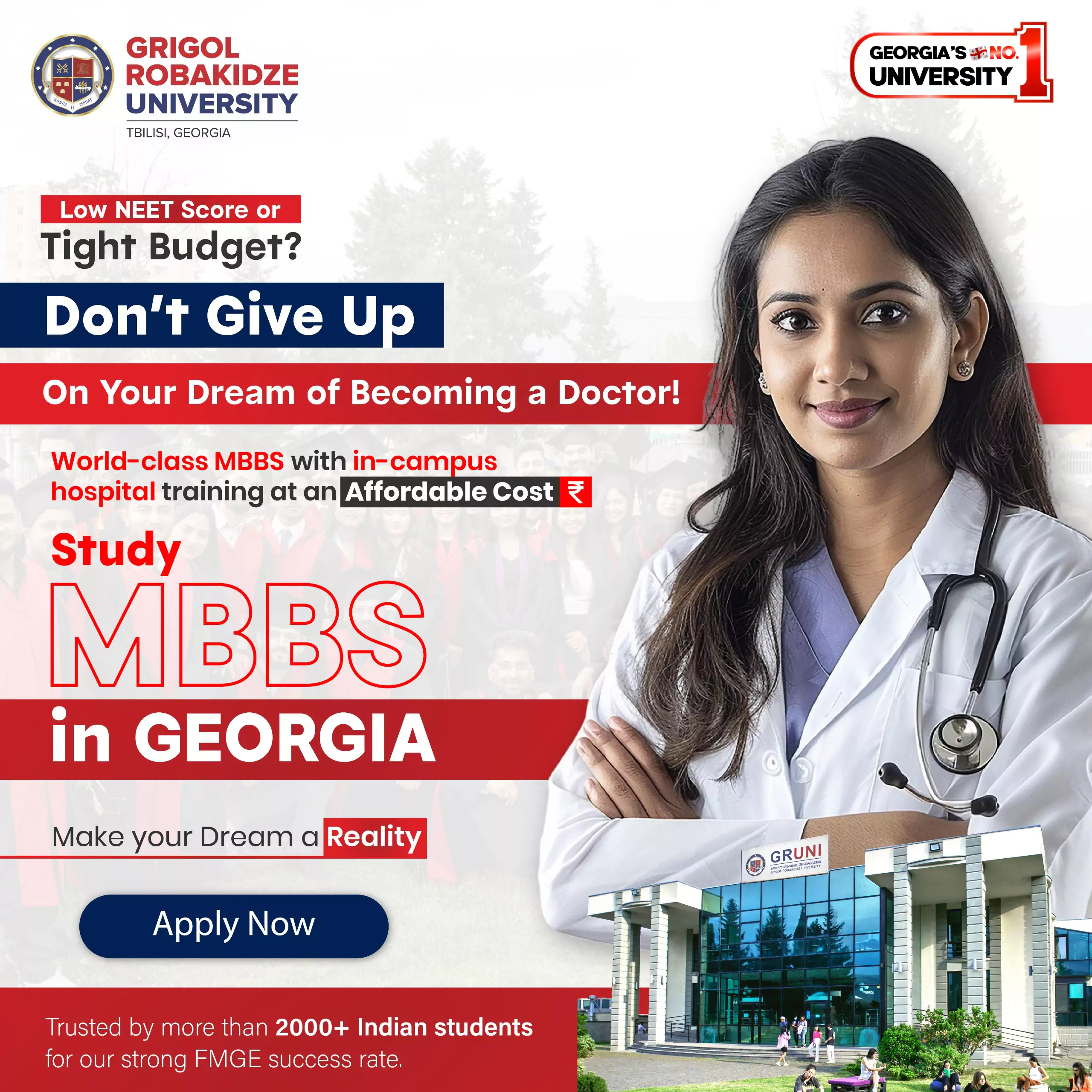Summary
- NMC-aligned, globally recognised MD (equivalent to MBBS in India) programs
- Affordable tuition fees and low living costs for Indian students
- English-medium education with early clinical exposure
- Strong FMGE support and continuously rising pass rates
- Safe, culturally familiar environment with Indian food and hostels
When I first started exploring MBBS abroad options a few years back, Georgia wasn’t on top of my list. Most parents and counsellors were focused on countries like Russia, Ukraine, or Western Europe. But as I began guiding more students and researching deeply, Georgia started standing out because of the real advantages it has over other MBBS abroad destinations. By 2024, over 16,000 Indian students were already studying medicine in Georgia. That number alone spoke volumes.
Through hundreds of student queries, university reviews, and alumni feedback, I’ve gathered insights that I now share with every aspiring medical student and their parents. Here are 7 good things I’ve learned about pursuing MBBS in Georgia, based on real experiences and conversations with students and faculty.
Quality Education and Modern Training
The first standout feature is the high academic standard of Georgian universities. The MBBS course (referred to as MD) spans 6 years, structured around a Western-style curriculum. Universities emphasise clinical exposure from the early years, not just in theory, but with real patients under supervision.
What really impressed me was the growing use of simulation labs, high-tech setups where students practice medical procedures in a safe, controlled environment. This approach mirrors systems in countries like the U.S., giving Georgian MBBS students a competitive edge.
And results back it up: Georgia had the highest FMGE pass rate among major foreign study destinations in 2024. Many universities, like GRUNI, DTMU, and NVU, now offer FMGE coaching with Indian faculty.
Some even align their curriculum with USMLE standards, offering dual pathways, either practice in India or aim for the U.S. later. For me, as a counsellor, this proves one thing: Georgia is serious about producing globally competent doctors.
Globally Recognised, NMC-Aligned Degrees
One of the biggest concerns Indian families have is: Will my child’s degree be valid in India?
The answer is a resounding yes. Georgia’s top universities are:
- NMC-aligned (as per the National Medical Commission of India)
- Listed in the World Directory of Medical Schools (WDOMS)
- Recognised by WHO, ECFMG, and FAIMER, enabling eligibility for FMGE, USMLE, PLAB, and other global exams
About 25 Georgian universities hold NMC approval, including well-known ones like:
- Grigol Robakidze University (GRUNI)
- Tbilisi State Medical University (TSMU)
- David Tvildiani Medical University (DTMU)
For instance, GRUNI had an impressive 138 students who passed FMGE in 2024, showing it not only meets Indian standards but also prepares students well for practice in India.
Affordable Tuition and Living Costs
Studying MBBS in Georgia is budget-friendly, a crucial point for middle-class Indian families. Here’s a rough breakdown:
- Tuition fees: $4,000-$8,000 per year
- Living expenses: $200-$300 per month
- No donation/capitation fees at all
So the total yearly cost (tuition + living) comes to about ₹5.5-7.5 lakhs, a fraction of what private Indian medical colleges charge, and far more affordable than Western countries.
Example: GRUNI charges around $5500 for tuition.
The affordability without compromising quality makes Georgia a top value-for-money destination for MBBS abroad.
English-Medium Instruction (No Language Barrier)
Language comfort was another relief. All major Georgian medical universities conduct their entire MBBS program in English for international students.
That means:
- No need to learn Georgian to follow classes
- Lectures, textbooks, and exams, all in English
- Medical terminology stays familiar throughout the course
Yes, some basic Georgian is taught (helpful for patient interaction), but the academic part is 100% English. This makes learning smooth for Indian students from CBSE/ICSE backgrounds.
Plus, with Indian, African, and Arab students forming a large part of the class, English is the common campus language, which builds a natural comfort zone.
Comfortable for Indian Students (Culture & Food)
Moving abroad can be daunting, but Georgia scores high on cultural familiarity and support for Indian students:
- Thousands of Indians are already studying there, you’ll find peer support, festivals, and seniors to guide you
- Many universities have Indian Mess facilities offering North/South Indian food
- Indian restaurants and grocery stores are easy to find in cities like Tbilisi and Batumi
- Separate hostels for boys and girls are available in many universities
- Indian Student Associations help organise Diwali, Holi, and Onam celebrations
Even the climate is comparable to North India, with snowy winters, pleasant spring/autumn, and mild summers.
Georgia really offers that “home away from home” feeling, something every student needs to thrive abroad.
Hands-On Clinical Training and Infrastructure
Medical education is not just books; it’s practice. Georgia delivers this well through:
- Early clinical exposure (from 3rd year itself)
- Partnerships with modern, well-equipped hospitals in Tbilisi, Batumi, etc.
- Use of simulation labs for surgeries, emergency care, and diagnostics
- Small batch sizes, meaning more personalised training
- Digital libraries and e-resources for self-paced learning
I was especially impressed by New Vision University’s investment in simulation centers, and TSMU’s global academic collaborations.
With such infrastructure, Georgian MBBS grads gain real patient-handling confidence, an area where many foreign programs fall short.
Safe and Welcoming Environment (Plus Easy Visa Process)
Safety and simplicity matter, especially for Indian parents. Georgia excels on both fronts:
- Ranked among the safest countries in Europe
- Low crime and corruption
- Friendly, respectful locals who are used to international students
- Secure campuses with 24/7 hostel surveillance
Visa-wise, the process is smooth and student-friendly:
- Student visa (D3 category) usually processed within a few weeks
- High approval rate for Indian applicants (~95%)
- Easy annual renewal throughout your course
- No embassy interviews in most cases
This gives families the peace of mind that no bureaucratic red tape will disrupt their child’s education journey.
Rising Hope for Indian Medical Aspirants
As a counsellor who has worked with hundreds of students and parents, I can confidently say: Georgia offers an exceptional blend of affordability, quality, recognition, and safety.
Yes, every country has pros and cons, and studying abroad always involves adjustment. But if your priorities include:
- A recognised MBBS degree
- English-medium education
- High FMGE readiness
- Affordable fees
- Safe, student-friendly cities
…then Georgia is absolutely worth considering.
Sometimes, the less obvious choice turns out to be the smartest one. Georgia may not have made headlines like some other countries, but its steady rise in FMGE results, student satisfaction, and infrastructure shows it’s not just an alternative; it’s a serious contender.
If you’re a student or parent weighing your MBBS options, Georgia deserves a spot at the top of your list. Let this be your next step toward a successful and fulfilling medical career.
By an MBBS Admission Counsellor for Indian Students



